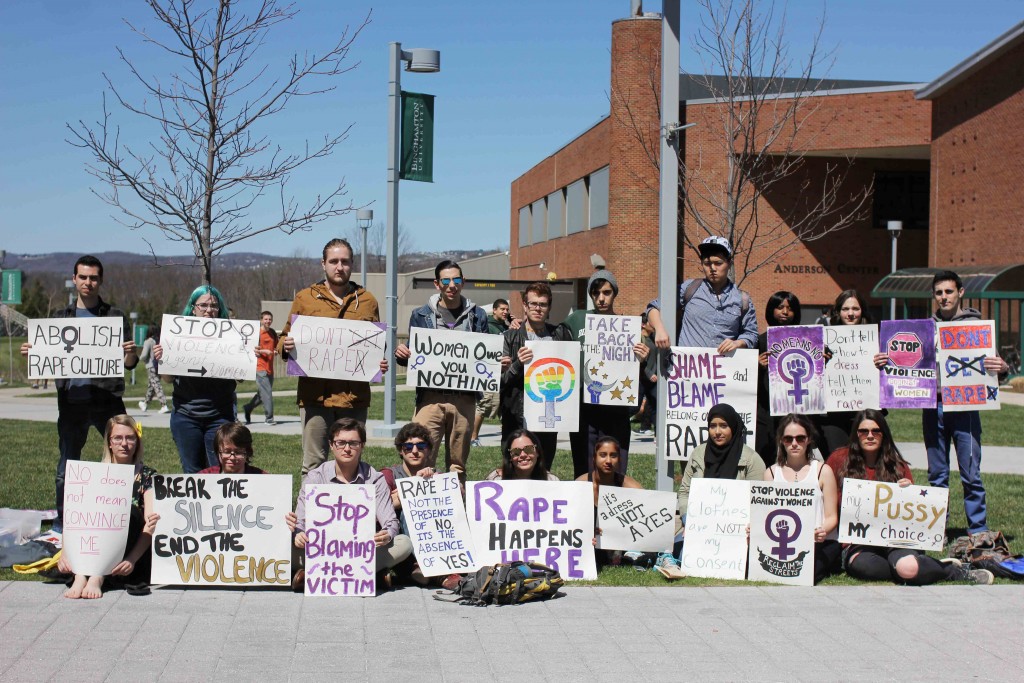
Sitting silently and armed with posters featuring phrases like “My pussy, my choice,” “’No’ doesn’t mean ‘convince me’” and “stop violence against women,” Binghamton University’s Women’s Student Union (WSU) and its allies took to the Spine to shed light on the issue of sexual assault.
On Wednesday afternoon, WSU occupied campus with its “Line the Spine” event. The event was held as a part of the club’s Sexual Assault Awareness Week, inspired by Take Back the Night, a national campaign that WSU sponsors on campus each year. This year, they decided to extend the campaign by hosting events all week to spread knowledge about sexual assault, including a trivia event with facts about sexual assault. The culminating event of Take Back the Night will occur Friday at 8 p.m. at the Peacemaker’s Stage in Downtown Binghamton.
“Line the Spine” was designed to promote awareness of violence against women for the average student walking down the Spine. WSU members sat silently with signs that they had made as a way to represent the victims of sexual assault and answered individual questions about the campaign.
Raaga Rajagopala, the multicultural representative for WSU and a sophomore double-majoring in economics and French, said that the event was meant to relay short, powerful messages about the topic to the student body.
“We’re students who are standing in solidarity for the cause of helping victims of sexual assault,” Rajagopala said. “We’re holding posters of what we like to believe are powerful messages. By sitting here in a high-traffic area, we can draw attention to the pressing issue of sexual assault.”
Janet Nelson, the vice president of WSU and a junior double-majoring in psychology and linguistics, said that the group chose to have its demonstration on the Spine to reach a wide audience.
“For a lot of our educational events, the people who come are people who already know and already care, so this whole week of awareness campaigns targets people who generally don’t know and don’t care,” Nelson explained. “We want to reach as many people as we can.”
Nicole Mengler, a member of WSU and a sophomore majoring in psychology, held a sign that read, “Don’t tell women how to dress, tell men not to rape.” She said she chose to deliver that message because she had seen too much blame placed on women’s outfit choices.
“Girls get penalized for wearing things that really aren’t that inappropriate just because their teachers are uncomfortable with it, which is really disgusting because it takes time away from class,” Mengler said. “The way you dress shouldn’t make you more susceptible to any type of sexual harassment or sexual abuse.”
Victor Tarantino, a senior majoring in philosophy, politics and law, said what WSU was doing was important because it brings to light an issue that is extremely prevalent, but whose victims are often silenced. He added that for men, it’s important to listen and be an ally.
“I think that statistics speak for themselves, and right now, one in four women will be sexually assaulted on college campuses and one in 20 men will,“ Tarantino said. “I think that it’s important, as a man myself, to be an advocate for sexual assault awareness because I think it’s important to have male allies, but it’s also important as an ally to know when your voice is supposed to be the one that’s heard.”
Nelson expressed that each WSU event this week is important to helping to end sexual assault.
“It’s a slow and tedious process,” Nelson said. “The ultimate goal will not happen likely in my lifetime, but the small steps we’re taking is to one day abolish sexual assault.”


